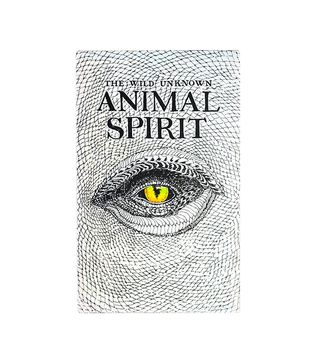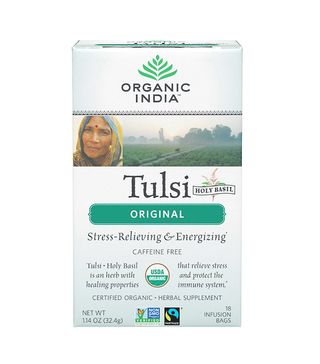Apparently, Your Metabolism Has a Spirit Animal—What's Yours?
I am not effortless. I like who I am, and I can also admit that my true nature does not include that certain je ne sais quoi inherent to women who “woke up like this.” My phone is always at 19%, I’m perpetually 10 minutes late for everything, and I definitely don’t wash my Beautyblender as often as I should. Recently, however, I realized that my maladroit charm was getting, well, less charming: I was struggling to concentrate at work, sleeping restlessly, and feeling a constant low-level buzz of stress. My digestion was off, and my shoulder muscles had wound themselves into seaworthy knots. I felt like I was bouncing back and forth between anxiety and spacey forgetfulness with no room for equilibrium.
I lamented this weird shift in energy to a friend, fully expecting her to rightfully chastise my inability to leave the house on time and my love of late-night screen time. I was thrown for a loop when she—who, for the record, is calm, punctual, and always has shiny hair—said she understood. Furthermore, she revealed that her personal laundry list of seemingly unrelated issues had a common cause: her metabolism. When I pressed her for more info, she told me to set up an appointment with Wildly You.

In short, Wildly You is part Ayurvedic nutrition, part spirit animal quest. Whereas traditional Ayurveda banishes toxins by balancing our doshas—that is, the elements that work together to make us who we are—Wildly You has updated the way we think about holistic healing, recasting doshas as animal archetypes based on our individual metabolic makeups.
“Wildly You is a health platform that uses animal archetypes to represent different body types,” explains co-founder Katie Grossman. Animals are assigned by assessing one’s bone mass and core muscle mass—basically, how your body processes energy and distributes what it doesn’t burn—to create a system of 14 metabolic configurations and corresponding animals. Grossman adds, “Wild animals are a perfect mentor or ‘role model’ for humans to learn how to stay in balance with nature, ultimately optimizing our brains, bellies, and bodies. A defining feature of Wildly You is the body-type assessment system, rooted in the warrior tradition [when] warriors had to size up their opponents in seconds. So we created an assessment where finding your body type is quick and easy.” Translation: An illustrated chart helps you match your body type to your dietary spirit creature. “After discovering your body type,” says Grossman, “we give you access to tailored home remedies, recipes, exercises, and lifestyle routines for your body type and preferences.” Animals, warriors, and wellness? My curiosity was piqued; I set up an appointment for a full Wildly You animal appraisal.
I wish I could say that eating according to my power animal was the craziest diet I’d ever tried. I often feel overwhelmed with information on the next best thing in eating well, from master cleanses to which superfood is trending, and I’m usually disappointed when I discover that this week’s holy grail isn’t actually good for me. While Wildly You’s take on metabolic medicine was certainly new to me, the plan’s practices are anything but a fad. Ayurveda shows up in Vedic texts dating to the sixth century BCE; just because we’re only now getting wise to turmeric and ashwagandha doesn’t mean that they haven’t been working their magic for millennia. And, honestly, beyond its possible efficacy, discovering my gut-health spirit animal sounded fun. No matter what I took from my appointment, at least I would have an experience.

In true form, I showed up to my assessment late, disheveled, and feeling decidedly unwell after a few too many gin-and-tonics the night before. Luckily, Grossman was warm and kind, absolving me of my late-night transgressions while we discussed what was going on with my body. I explained my seemingly random assortment of symptoms as she lavished me with pressure-point therapy and massage. She went so far as to massage my belly, a decidedly uncomfortable process (thanks, hangover). Amazingly, though, I felt better afterward and not just physically: It was as though she had worked out the proverbial anxiety knot in my stomach, leaving me calm and clear-headed. Grossman explained that the abdomen has four groups of muscles that, like all muscles, can hold onto physical and emotional tension.After my massage, I got my diagnosis: I’m a panther. In traditional Ayurvedic terms, this is a body type with strong pitta (fire) and vata (wind) energy. Panthers are described as “passionate, attractive, and enthusiastic by nature,” and in addition to feeling flattered, I was struck by how on-point Grossman’s assessment was. She noted that panthers tend to overheat—a constant problem that interrupts my sleep, one which I hadn’t told her about—and mentioned how important it was that I don’t skip meals. I realized that for the last few months, I had been skipping breakfast, only to crash in the afternoon. I would amend my low energy with a heaping portion of sugar, then start the process all over again. I hadn’t been pacing myself at all in terms of my eating habits, and it was showing in my moodiness, restlessness, stress, and insomnia. I won’t pretend to understand how Grossman could know about my private eating habits through our brief assessment, so when she called me out on my bad dietary habits, I was eager to see how accurate her advice would be.
The goal is to take control of your own health by educating yourself and listening to your gut for guidance.
“Eating based on your animal type optimizes productivity, vitality, and beauty. You can achieve optimal health inside and out,” explains Grossman. “The goal is to take control of your own health by educating yourself and listening to your gut for guidance.” For me, personally, Grossman recommended that I change not only what I eat but how I eat: “Panthers do best when they practice being never hungry and never full. They generally have a good appetite, so it’s important to take their time eating and remember to chew well.”
Grossman recommended I supplement meals with smoothies and tea. I’ve never encountered a diet that told me to eat more; needless to say, I was happy to experiment with increased snacking. Grossman’s favorite tea for any animal type is tulsi tea, or holy basil, “an adaptogenic herb that alleviates anxiety and depression.”

Grossman also recommended that I keep up the weird-but-magic belly massage to release tension all over my body. “In utero, every part of our body grew via the umbilical cord,” she explained. “By regularly massaging your belly, you can open pathways to the entire body, increase circulation, release back muscles, relieve back pain, and improve digestion.” Belly massage is actually ideal for all animal types, regardless of dosha, Grossman added. She recommends using lotion or oil to make the massage a true self-care ritual.

“Under and overeating, excessive dieting or restricting, excessive caffeine consumption, and excessive water consumption are among the common mistakes all women make related to nutrition,” Grossman said. She added that all metabolic types can benefit from a policy of “almost hungry, almost full.” She elaborated, “When we get hungry, we tend to overeat foods that are close by and quick to consume. By avoiding hunger, we allow more time to make healthier choices, and we protect ourselves from acidity and inflammation.”Supplements are a great way to boost your energy without dramatically changing your routine, noted Grossman. She recommends shilajit, a Himalayan plant-based mineral complex that allows you to “remineralize your body and gain acuity and energy.” She also endorsed tinctures and tea made from chaga, a mushroom that boasts superior anti-inflammatory and pain-relieving properties.Grossman’s final word of advice for everybody? “Listen to your gut. Drink small cups of warm or hot water to bring awareness into your belly. Gut instincts never lie. Ask and listen to what your gut tells you!”
Research Ayurveda, practice things that sound inviting, and test everything yourself!
It’s been about three months since I was assessed and started eating truer to my panther nature, and I can honestly say that I’m amazed by how much more rested and energized I feel. Wildly You’s focus on gut health is heavily vetted—studies have determined that intestinal microbiota influence everything from diabetes to depression—and the animal allegories made remembering to take care of my metabolism more of a novelty than a chore. (As a lover personality quizzes, I definitely delighted in discovering the animals of anyone within earshot.)
I’m certainly still susceptible to stress—I don’t think anything can change the fact that I’m fundamentally a worrywart—but Grossman helped me realize that skipping meals and overworking myself weren’t actually making me more productive; in fact, they were hindering my work and making me miserable to boot. And if my improved sleep quality and increased stamina weren’t enough to keep me eating between meals, this also happens to be one of the easiest eating plans I’ve ever been on. Ayurvedic medicine centers around holistic wellness through the long-term balancing of energies, rather than drastic diets with constantly shifting rules and regimens.
Grossman says that anyone can implement Ayurvedic wellness into their lives in a real and manageable way: “Once you have a better understanding of your animal body type, pick one or two changes you would like to make in your daily diet/lifestyle. Experiment with these alterations for six to 12 weeks and assess how your health is doing. Depending on what your gut says, continue or take a break. Research Ayurveda, practice things that sound inviting, and test everything yourself!”
Next up: Apparently, there is such a thing as being “too happy,” according to psychologists.
Disclaimer
This article is provided for informational purposes only and is not intended to be used in the place of advice of your physician or other medical professionals. You should always consult with your doctor or healthcare provider first with any health-related questions.
